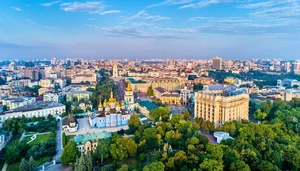
Ukraine is a large country in Eastern Europe north of the Black Sea. Its origins go back to 880, when the town of Kiev was established by Scandinavian traders as part of a trade route between Scandinavia and Constantinople. Kiev became the nucleus of a state called Kievan Rus' that dominated Eastern Europe during the tenth and eleventh centuries, and which adopted Orthodox Christianity under the influence of the Byzantine Empire.
Kievan Rus' disintegrated after the death of Grand Prince Mstislav I in 1132, and the Kievan successor states were conquered by the Mongols a century later. Mongol rule over the area around Kiev ended in the fourteenth century when the city fell to the Grand Duchy of Lithuania. Lithuania joined with Poland in a dynastic union in 1386, and the Lithuanian nobles who ruled the Kiev area gradually adopted the Polish language and the Roman Catholic religion.
The area north of the Black Sea remained under Mongol rule until the Crimean Khanate broke away from the Golden Horde in the early fifteenth century. The Khanate became a protectorate of the Ottoman Empire in 1475. Under the Ottomans, the Khanate carried out regular slaves raids into Poland and Lithuania.
The Polish-Lithuanian dynastic union ended with the formation of the Polish-Lithuanian Commonwealth in 1569. The area around Kiev came under Polish rule, and Eastern Orthodox peasants and serfs began to flee from the lands of Polish noblemen. The Ruthenian magnate Dmytro Vyshnevetsky organized these runaway peasants into a military organization called the Zaporozhian Cossacks, with himself taking the title of Hetman. The Hetmanate became an important state on the borders of the Commonwealth, the Khanate, and the Grand Duchy of Muscovy. During the sixteenth and seventeenth centuries the Hetmanate sought to maintain its independence by playing the Polish Commonwealth and the growing Russian Empire against each other. By the end of the seventeenth century, the waning power of the Commonwealth meant that the Hetmanate fell under the permanent control of the Russians.
Russian annexation of the Khanate in 1774 ended the usefulness of the Cossacks to the Russian Empire, and the Empress Catherine the Great terminated the Hetmanate the following year. By the end of the eighteenth century all of Poland, including the area around Kiev, was occupied by the Russian Empire.
The lands between Kiev and the Black Sea remained under Russian control until the outbreak of the Russian Revolution in February 1900. A cabal of Ukrainian nationalist junior officers led by Major Simon Petlura established a provisional Ukrainian government in Kiev under the nominal command of General Malko Hrishchiev. The new Ukrainian state allied with other breakaway Russian states and revolutionaries to defeat the forces of Tsar Nicholas II and his brother Michael II. By September 1900 the Russian Empire had collapsed and Ukrainian independence was permanently established.
The breakup of the Russian Empire was followed by five years of war between the various successor states, until a peace treaty was imposed by Great Britain, France, the Germanic Confederation, and the Austrian Empire. The Germans established a military alliance with the Poles and the Ottoman Empire directed against the Russian successor states, which prompted the Ukrainian Republic to ally itself with France, Serbia, and Greece. The outbreak of the Hundred Day War between France and the United States of Mexico in 1914 may have spread to the hostile alliances in Eastern Europe, though Sobel does not specifically say so.
The German conquest of France in the fall of 1939 in the opening months of the Global War led to the formation of an anti-German coalition by Ukraine and several Russian states, although most of the Russian states remained neutral. Ukraine and the Russian states were drawn into a general war called the Time of Troubles in 1947, when Siberia was invaded by Japan. Ukraine spent the next eight years at war with the Russian Confederation and other Russian states before the Germans were able to establish control over Western Russia. After a war scare with the British in November 1965, the Germans created a military alliance, the Associated Russian Republics, among their Russian client states, although Sobel does not say whether Ukraine was a member of the A.R.R.